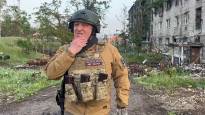Russia intends to join the Wagner group, which consists of convicted criminals, among other things, to its armed forces. Some of the mercenaries probably disappear into the world to make money, the researcher estimates.
At the weekend, the president of Russia Vladimir Putin the Wagner mercenary company, known as the hand cashier, turned against its master and began marching towards Moscow. Wagner Director Yevgeny Prigozhin demanded a change in the Russian military leadership.
However, the rebellion was short-lived and now the future of the Wagner company is uncertain.
interviewed someone working on commercial military companies for his dissertation at the University of Tampere Mikko from Räkkölää of Wagner.
What’s next for the Wagner Corps?
Russia announced on Saturday that it will merge the Wagner forces into the Russian armed forces and that the owner of the mercenary company Yevgeni Prigozhin will move to Belarus.
The change is the end of the notorious salary army, says researcher Mikko Räkköläinen.
– The Wagner forces in their current form will be discontinued. Those fighters who did not take an active part in the rebellion will be assimilated into the Russian armed forces.
Räkköläinen estimates that the troops who most actively participated in Prigožin’s rebellion will be repatriated. It is unclear whether they will possibly be charged later.
– Certainly some of the fighters will continue to fight somewhere else in the world. There is a global market for experienced mercenaries.
How will the termination of the Wagner forces affect the war in Ukraine?
The disbanding of the Wagner forces will not have an immediate effect on Russia’s war of aggression in Ukraine, Räkköläinen estimates.
In May, Wagner’s soldiers withdrew from the eastern front from Bahmut, where the fiercest battles of the spring have taken place, to wait for reinforcements.
– In the longer term, the effect is more unclear. Russia has a shortage of troops and this does not improve the situation.
Adding Wagner soldiers to the Russian armed forces might even make it easier for Russia to wage war.
Agreeing on issues between the two groups has been slow and difficult:
The orders coming from the Russian military leadership first went to the local commanders of the Wagner company. From there, the orders were sent to the company’s management, who gave them their own approval before implementation. Now this step is removed, and it may speed up the response.
How significant a military force are the Wagner forces in relation to the Russian armed forces?
Not at all.
Wagner has an estimated 10,000–25,000 soldiers in his ranks in Europe. This is a fraction of the strength of Russia’s entire armed forces, which is over a million soldiers.
– Prigozhin’s troops do not pose a real military threat to Vladimir Putin’s administration, says Räkköläinen.
– In my opinion, the march towards Moscow seen over the weekend cannot be considered an actual coup attempt, but mainly Prigozhin’s last attempt to hold on to his position.
Wagner is active in, for example, the Middle East and Africa. Will Wagner’s mercenaries continue to operate outside of Europe?
The situation in developing countries is unclear.
Russia has used Wagner to spread its influence in Sudan and Syria, for example.
In developing countries, Russia is mostly an ally of the regime, and the Wagner forces have acted as military advisors in the fight against rebels, among other things.
In return for their help, Prigožin’s other companies have received rights to, for example, revenues from mines and oil fields.
– Now this pattern will probably change, because Wagner will stop working in its current form, says Räkköläinen.
– How the business will be organized in the future, it is impossible to say yet, the researcher continues.
Content in other languages
